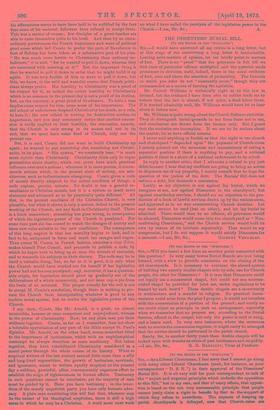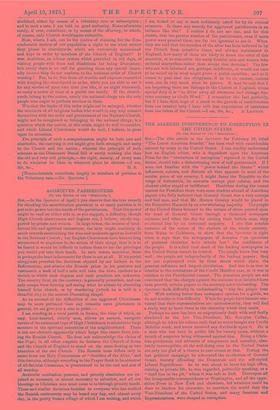[TO THE EDITOR OF TEM "SPECTATOR. ")
Sitt,—Asa Liberal Churchman, I feel sorry that I cannot go along with many other 'Liberal 'Churchmen (such, for instance, as your correspondent ." D. S. R. ") in their approval of the Dissenters' Burial Bill. It is all very well for your -correspondent to 'talk of 'the " unjust and ungenial principles which underlie the opposition, to this Bill," but in my case, and 'that of many others, that opposi- tion is based on the not very unreasonable principle that people cannot justly claim a right to benefit by that to theetipport df which they refuse to contribute. The expense of keeping up parish churchyards is defrayed, new that Chinch-rates are abolished, either by means of a voluntary rate or subscription ; and to such a rate, I am told on good authority, Nonconformists rarely, if over, contribute, or by means of the offertory, to which, of course, only Church worshippers subscribe.
Now, where, I ask, can be the justice of claiming for the Non- conformist section of our population a right to use what service they please in churchyards, which are exclusively maintained and kept in order by members of the Church of England? It was, doubtless, an odious system which prevailed in old days, of visiting people with fines and disabilities for being Dissenters ; but surely there is no call for granting them any special immu- nity because they do not conform to the national order of Church worship ? For, to be free from all trouble and expense connected with keeping the churchyard in order, while you are able to use it for any service of your own that you like, is no slight immunity, as many a rector or vicar of a parish can testify. If the church- yards belong to the nation, surely the national clergy are the only people who ought to perform services in them.
Whether the limits of this order might not be enlarged, whether the ministers of all religious bodies who would in any way connect themselves with the order and government of the National Church, might not be recognised as belonging to the national clergy, is a question which the nation, at this crisis, might do well to consider, and which Liberal Churchmen would do well, I believe, to press upon its attention.
The principle of such a comprehension might be both just and charitable, the carrying it out might give both strength and unity to the Church and the nation ; whereas the principle of such schemes as the Dissenters' Burial Bill is surely nothing else than the old and very evil principle,—the right, namely, of every man to do whatever he likes in whatever place he chooses.—I am, [Nonconformists contribute largely in numbers of parishes to the Voluntary rate.—En. Spectator.]



































 Previous page
Previous page